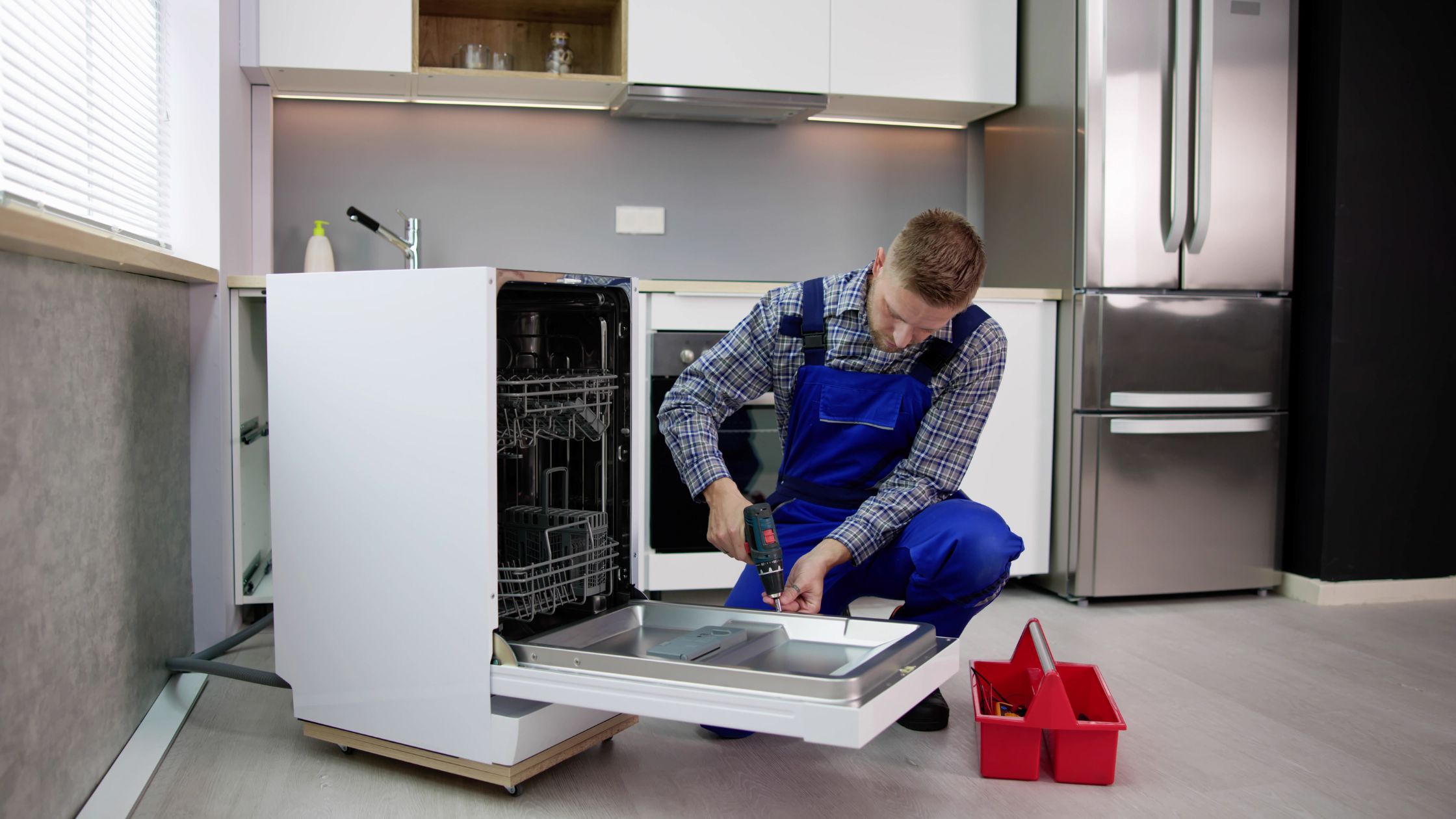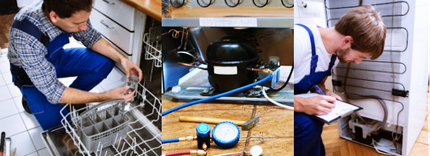The Ultimate Overview to Understanding Device Fixing in the house
When your refrigerator quits cooling down or your oven rejects to warmth, it can really feel overwhelming. Understanding home appliance repair service in the house can conserve you money and time. You'll learn to acknowledge symptoms, make use of vital devices, and follow an organized troubleshooting procedure. Before you start, there are critical safety precautions you require to take into account. What are one of the most usual problems, and exactly how can you repair them? Let's discover the fundamentals.
Common Device Problems and Their Symptoms
When your devices start acting up, it's vital to acknowledge the indications early on. Neglecting them can bring about bigger problems and costly repair services. For example, if your refrigerator isn't cooling properly, you might discover warm areas or condensation forming. This can suggest a stopping working compressor or an obstructed vent.Your dishwashing machine might reveal issues through dirty dishes or uncommon noises throughout cycles. If you hear grinding or clanking, it's time to investigate.A cleaning device that will not spin or drain pipes can leave you with soggy washing, suggesting a clogged up drain or a malfunctioning pump.Lastly, if your stove's temperature level seems off or it takes forever to pre-heat, you could be taking care of a faulty thermostat. By staying alert to these signs and symptoms, you can resolve problems prior to they escalate right into major repair services.
Important Devices for Appliance Repair Service
When you're dealing with home appliance repair services in your home, having the right tools is vital. Fundamental hand tools like screwdrivers and pliers will help you disassemble and fix various appliances, while electric screening gadgets ensure you're working securely with circuitry. Allow's review what you need to get going on your fixing trip.
Fundamental Hand Tools
Having the right devices is crucial for efficient home appliance repair work at home. Beginning with a trusted screwdriver collection, including both flathead and Phillips types, as screws are usual in home appliance assembly. Pliers are also vital; they assist with gripping, twisting, and reducing cords or little components. A set of needle-nose pliers can reach difficult situations quickly. You'll need an excellent flexible wrench for tightening or loosening nuts and bolts. An utility blade comes in handy for cutting via packaging or insulation. Don't fail to remember a sturdy workbench or surface area to securely organize your devices and parts. With these standard hand tools, you'll be well-prepared to take on most home appliance repairs that come your method.
Electric Testing Instruments
Together with standard hand tools, electric screening gadgets play a vital role in home appliance repair. These tools aid you diagnose electric concerns and guarantee home appliances function safely. A multimeter is essential; it measures voltage, present, and resistance, permitting you to identify troubles quickly. A non-contact voltage tester is one more essential, letting you identify online wires without making direct call, enhancing your security. Secure meters are great for determining existing circulation in wires without detaching them, conserving you time and initiative. In addition, circuit testers can swiftly examine if electrical outlets are working appropriately. By making use of these gadgets, you'll improve your troubleshooting process and enhance your repair work abilities, making device maintenance a lot simpler.
Step-by-Step Guide to Diagnosing Home Appliance Issues
When your device breaks down, it can be frustrating, however identifying the concern doesn't need to be overwhelming. You'll learn to identify usual troubles and use effective troubleshooting techniques. Let's walk through the actions to get your home appliance back in working order.
Typical Appliance Problems

Fixing Methods Explained

Fixing Major Kitchen Area Devices: A Closer Look
Have you ever before questioned just how to deal with common concerns with your kitchen area appliances? Fixing major kitchen area home appliances like fridges, ovens, and dishwashers can be much easier than you assume. Beginning by determining the trouble-- whether it's a fridge not cooling or an oven that will not heat. Usually, a basic reset or examining the power resource can solve the issue.For fridges, tidy the condenser coils and inspect the door seals. If your stove's not heating, evaluate the burner and thermostat. Dishwashers may just need a tidy filter or a reset to obtain them back at work. Always disconnect the home appliance before diving into repairs to assure your safety.Don' t forget to get in touch with the customer handbook for certain troubleshooting pointers associated with your design. With a bit of persistence and the right devices, you can with confidence deal with device repair work and save cash in the process!

Fixing Washing Appliances: Tips and Techniques
When your laundry appliances start breaking down, it can feel frustrating, however fixing them does not need to be a headache. Start by examining the power supply. Confirm the device is plugged in and the outlet is functioning. Next off, examine the door or cover button; a defective button can stop the equipment from operating.For washers, if it's not spinning, look for out of balance tons. Rearranging the garments might resolve the issue. If your dryer isn't heating, clean the lint filter and inspect the vent for blockages.Listen for unusual noises; they can suggest a trouble. If your appliance is dripping, examine the hoses for cracks or loose connections. Document any error codes shown on digital screens, as they can lead you in identifying the issue. Consult the user manual for specific troubleshooting tips related to your model.
Safety Preventative Measures to Take Throughout Services
Prior to you start any appliance repair work, it's important to focus on security to avoid accidents or injuries. Disconnect the device or turn off the circuit breaker to guarantee no power reaches it while you function. Usage protected tools to minimize the danger of electrical shock. Use safety and security goggles and gloves to shield yourself from sharp edges or debris (Dependable Refrigeration & Appliance Repair Service Washer repair near me).Make certain your work space is clean and well-lit, so you can see what you're doing. Maintain youngsters and pets far from the location to avoid interruptions and possible hazards. If you're dealing with gas devices, be extra cautious; look for leakages before proceeding.Take your time, and don't rush via repairs. If you feel unsure regarding any type of action, it's better to stop and research than to think. Adhering to these precautions will certainly assist create a much safer atmosphere for your DIY appliance repair work job
When to Call a Professional for Aid
Exactly how do you recognize if it's time to hire a professional for device repair services? If you've attempted standard troubleshooting without success, it's a clear indicator. As an example, if your home appliance still won't start or reveals unusual sounds after resetting it, do not wait to look for specialist help.When you discover leaks, smoke, or shedding smells, prioritize safety and call a professional right away. These concerns can cause even more significant damage or position risks to your Going Here home.Also, if your home appliance is under service warranty, speaking to a specialist is typically the most effective route. They can guarantee that repair services won't nullify your guarantee, conserving you cash in the long run.Finally, if you're uncertain or awkward with complicated repair work, it's a good idea to leave it to the professionals. Bear in mind, dealing with challenging issues without the appropriate expertise can lead to costly mistakes. Trust fund a specialist when doubtful!
Often Asked Concerns
Exactly How Can I Prevent Home Appliance Issues in the Future?
To avoid appliance problems in the future, you need to perform normal maintenance, check for wear and tear, clean filters, and stay clear of overloading. Remaining proactive will certainly help prolong their life-span and maintain them running efficiently.
What Are one of the most Usual DIY Device Repair Mistakes?
You may overlook security preventative measures, skip repairing steps, or utilize wrong tools when attempting DIY device repairs. Hurrying the procedure or disregarding producer guidelines can bring about even more considerable concerns and pricey mistakes. Remain patient and notified!
How Do I Know if a Part Needs Replacement?
You can tell if a component requires replacement by examining for unusual sounds, leaks, or inconsistent efficiency. If the device battles to run appropriately or shows visible damages, it's likely time for a substitute.
Can I Utilize Generic Components for Home Appliance Repair Works?
Yes, you can utilize generic components for device repair services, but establish they're suitable - Dependable Refrigeration & Appliance Repair Service Washer repair near me. Common components might save you money, yet they can impact efficiency or durability, so evaluate your choices meticulously before making a choice
What Service Warranties Cover Appliance Repair Works?
The majority of device service warranties cover repair work for producing flaws, yet they typically exclude damages from abuse. Inspect your service warranty terms carefully, as some might require utilizing certified service technicians and original parts for coverage to stay valid.